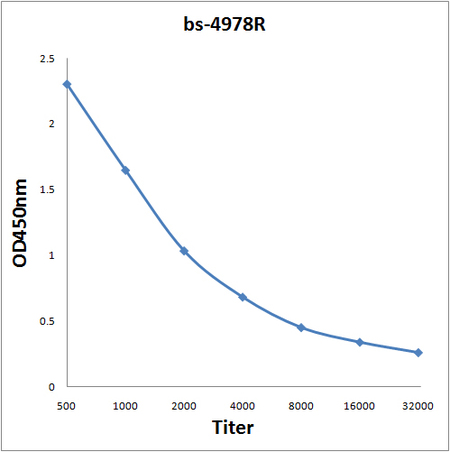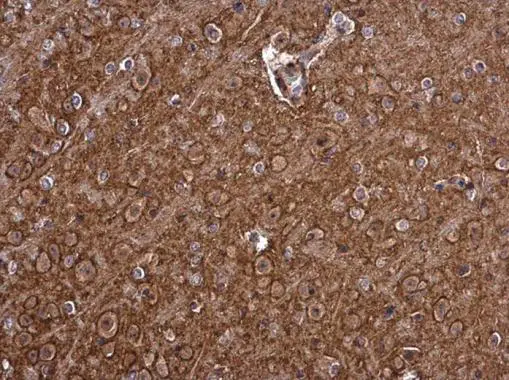![IHC-P analysis of human tonsil tissue using GTX22825 PMCA ATPase antibody [5F10]. Left : Primary antibody Right : Negative control without primary antibody Antigen retrieval : heat induced antigen retrieval was performed using 10mM sodium citrate (pH6.0) buffer, microwaved for 8-15 minutes Dilution : 1:200 IHC-P analysis of human tonsil tissue using GTX22825 PMCA ATPase antibody [5F10]. Left : Primary antibody Right : Negative control without primary antibody Antigen retrieval : heat induced antigen retrieval was performed using 10mM sodium citrate (pH6.0) buffer, microwaved for 8-15 minutes Dilution : 1:200](https://www.genetex.com/upload/website/prouct_img/normal/GTX22825/GTX22825_1164_IHC-P_w_23060620_820.webp)
IHC-P analysis of human tonsil tissue using GTX22825 PMCA ATPase antibody [5F10]. Left : Primary antibody Right : Negative control without primary antibody Antigen retrieval : heat induced antigen retrieval was performed using 10mM sodium citrate (pH6.0) buffer, microwaved for 8-15 minutes Dilution : 1:200
PMCA ATPase antibody [5F10]
GTX22825
ApplicationsFlow Cytometry, ImmunoFluorescence, ImmunoPrecipitation, Western Blot, ImmunoCytoChemistry, ImmunoHistoChemistry, ImmunoHistoChemistry Frozen, ImmunoHistoChemistry Paraffin, Neutralisation/Blocking
Product group Antibodies
ReactivityAmphibian, Bovine, Canine, Chicken, Feline, Hamster, Human, Mouse, Porcine, Primate, Rabbit, Rat, Sheep
TargetATP2B1
Overview
- SupplierGeneTex
- Product NamePMCA ATPase antibody [5F10]
- Delivery Days Customer9
- Application Supplier NoteWB: 1:1000-1:5000. ICC/IF: 1:100-1:200. IHC-P: 1:500. IHC-Fr: 1:500. FCM: 1microg/test. *Optimal dilutions/concentrations should be determined by the researcher.Not tested in other applications.
- ApplicationsFlow Cytometry, ImmunoFluorescence, ImmunoPrecipitation, Western Blot, ImmunoCytoChemistry, ImmunoHistoChemistry, ImmunoHistoChemistry Frozen, ImmunoHistoChemistry Paraffin, Neutralisation/Blocking
- CertificationResearch Use Only
- ClonalityMonoclonal
- Clone ID5F10
- ConjugateUnconjugated
- Gene ID490
- Target nameATP2B1
- Target descriptionATPase plasma membrane Ca2+ transporting 1
- Target synonymsMRD66, PMCA1, PMCA1kb, plasma membrane calcium-transporting ATPase 1, ATPase, Ca++ transporting, plasma membrane 1, plasma membrane calcium pump
- HostMouse
- IsotypeIgG2a
- Protein IDP20020
- Protein NamePlasma membrane calcium-transporting ATPase 1
- Scientific DescriptionThe protein encoded by this gene belongs to the family of P-type primary ion transport ATPases characterized by the formation of an aspartyl phosphate intermediate during the reaction cycle. These enzymes remove bivalent calcium ions from eukaryotic cells against very large concentration gradients and play a critical role in intracellular calcium homeostasis. The mammalian plasma membrane calcium ATPase isoforms are encoded by at least four separate genes and the diversity of these enzymes is further increased by alternative splicing of transcripts. The expression of different isoforms and splice variants is regulated in a developmental, tissue- and cell type-specific manner, suggesting that these pumps are functionally adapted to the physiological needs of particular cells and tissues. This gene encodes the plasma membrane calcium ATPase isoform 1. Alternatively spliced transcript variants encoding different isoforms have been identified. [provided by RefSeq, Jul 2008]
- ReactivityAmphibian, Bovine, Canine, Chicken, Feline, Hamster, Human, Mouse, Porcine, Primate, Rabbit, Rat, Sheep
- Storage Instruction-20°C or -80°C,2°C to 8°C
- UNSPSC41116161
References
- Transport of Glucose by the Plasma Membrane Affects the Removal and Concentration of Ca2+ at Rest in Neurons - Implications of a Condition Prior to Alzheimers Disease? Alves VS et al., 2020 Apr 1, NeuroscienceRead this paper

![FACS analysis of Hela cells using GTX22825 PMCA ATPase antibody [5F10] compared to an isotype control (blue). Dilution : 1 ug/test for 40 min at room temperature Fixation : 2% paraformaldehyde FACS analysis of Hela cells using GTX22825 PMCA ATPase antibody [5F10] compared to an isotype control (blue). Dilution : 1 ug/test for 40 min at room temperature Fixation : 2% paraformaldehyde](https://www.genetex.com/upload/website/prouct_img/normal/GTX22825/GTX22825_163_FACS_w_23060620_358.webp)
![ICC/IF analysis of HeLa cells using GTX22825 PMCA ATPase antibody [5F10]. Cells were probed without (right) or with(left) an antibody. Green : Primary antibody Blue : Nuclei Red : Actin Fixation : formaldehyde Dilution : 1:100 overnight at 4 oC ICC/IF analysis of HeLa cells using GTX22825 PMCA ATPase antibody [5F10]. Cells were probed without (right) or with(left) an antibody. Green : Primary antibody Blue : Nuclei Red : Actin Fixation : formaldehyde Dilution : 1:100 overnight at 4 oC](https://www.genetex.com/upload/website/prouct_img/normal/GTX22825/GTX22825_512_ICC-IF_w_23060620_170.webp)
![FACS analysis of Jurkat cells using GTX22825 PMCA ATPase antibody [5F10] compared to an isotype control (blue). Dilution : 1 ug/test for 40 min at room temperature Fixation : 2% paraformaldehyde FACS analysis of Jurkat cells using GTX22825 PMCA ATPase antibody [5F10] compared to an isotype control (blue). Dilution : 1 ug/test for 40 min at room temperature Fixation : 2% paraformaldehyde](https://www.genetex.com/upload/website/prouct_img/normal/GTX22825/GTX22825_164_FACS_w_23060620_808.webp)
![ICC/IF analysis of C6 cells using GTX22825 PMCA ATPase antibody [5F10]. Cells were probed without (right) or with(left) an antibody. Green : Primary antibody Blue : Nuclei Red : Actin Fixation : formaldehyde Dilution : 1:200 overnight at 4oC ICC/IF analysis of C6 cells using GTX22825 PMCA ATPase antibody [5F10]. Cells were probed without (right) or with(left) an antibody. Green : Primary antibody Blue : Nuclei Red : Actin Fixation : formaldehyde Dilution : 1:200 overnight at 4oC](https://www.genetex.com/upload/website/prouct_img/normal/GTX22825/GTX22825_511_ICC-IF_w_23060620_545.webp)
![IHC-P analysis of human brain tissue using GTX22825 PMCA ATPase antibody [5F10]. Left : Primary antibody Right : Negative control without primary antibody Antigen retrieval : heat induced antigen retrieval was performed using 10mM sodium citrate (pH6.0) buffer, microwaved for 8-15 minutes Dilution : 1:200 IHC-P analysis of human brain tissue using GTX22825 PMCA ATPase antibody [5F10]. Left : Primary antibody Right : Negative control without primary antibody Antigen retrieval : heat induced antigen retrieval was performed using 10mM sodium citrate (pH6.0) buffer, microwaved for 8-15 minutes Dilution : 1:200](https://www.genetex.com/upload/website/prouct_img/normal/GTX22825/GTX22825_1163_IHC-P_w_23060620_272.webp)
![IHC-P analysis of human colon carcinoma tissue using GTX22825 PMCA ATPase antibody [5F10]. Left : Primary antibody Right : Negative control without primary antibody Antigen retrieval : heat induced antigen retrieval was performed using 10mM sodium citrate (pH6.0) buffer, microwaved for 8-15 minutes Dilution : 1:100 IHC-P analysis of human colon carcinoma tissue using GTX22825 PMCA ATPase antibody [5F10]. Left : Primary antibody Right : Negative control without primary antibody Antigen retrieval : heat induced antigen retrieval was performed using 10mM sodium citrate (pH6.0) buffer, microwaved for 8-15 minutes Dilution : 1:100](https://www.genetex.com/upload/website/prouct_img/normal/GTX22825/GTX22825_1162_IHC-P_w_23060620_363.webp)
![WB analysis of 25 ug of U251 (lane 1), human brain (lane 2) and C2C12 (lane 3) lysates using GTX22825 PMCA ATPase antibody [5F10]. Dilution : 1:2000 WB analysis of 25 ug of U251 (lane 1), human brain (lane 2) and C2C12 (lane 3) lysates using GTX22825 PMCA ATPase antibody [5F10]. Dilution : 1:2000](https://www.genetex.com/upload/website/prouct_img/normal/GTX22825/GTX22825_1611_WB_w_23060620_718.webp)
![ICC/IF analysis of U251 cells using GTX22825 PMCA ATPase antibody [5F10]. Cells were probed without (right) or with(left) an antibody. Green : Primary antibody Blue : Nuclei Red : Actin Fixation : formaldehyde Dilution : 1:200 overnight at 4oC ICC/IF analysis of U251 cells using GTX22825 PMCA ATPase antibody [5F10]. Cells were probed without (right) or with(left) an antibody. Green : Primary antibody Blue : Nuclei Red : Actin Fixation : formaldehyde Dilution : 1:200 overnight at 4oC](https://www.genetex.com/upload/website/prouct_img/normal/GTX22825/GTX22825_513_ICC-IF_w_23060620_693.webp)






